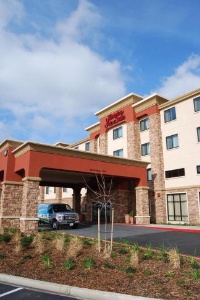Oct 6 2010
Hampton Hotels today announced that the Hampton Inn and Suites Folsom, CA achieved LEED® certification, as recognized by the U.S. Green Building Council (USGBC).
This is the second Hampton hotel property to earn LEED recognition for sustainable building design, construction and operations.
“We are proud to add the Hampton Inn & Suites Folsom to the property list of LEED certified Hampton hotels,” said Phil Cordell, Global Head, Focused Service and Hampton Brand. “Sustainability is a driving force for the brand and for Hilton Worldwide. Partnering with franchisees like Folsom Lodging keeps us at the forefront of our industry segment and helps us reach our corporate goal of becoming a more sustainable conscious brand.”
 The Hampton Inn and Suites Folsom, CA
The Hampton Inn and Suites Folsom, CA
The Hampton Inn & Suites Folsom received its LEED certification on July 29, 2010. Tasked with overseeing the LEED process, Technical Designs, Reno, NV, helped to incorporate a variety of sustainable design strategies to achieve the certification, including categories in: Sustainable Site Design, Reduced Water Use, Optimized Building Energy Performance, Sustainable Building Products, Construction Recycle Management, and Improved Indoor Air Quality.
“We were very passionate about pursuing this build and from the start we knew that Hampton was the perfect hotel brand to partner with to help us gain LEED certification,” said Rohit Ranchhod, Managing Member of Folsom Lodging LLC. “We are proud to receive this certification knowing that we are contributing to saving energy for the future.”
The Hampton Inn and Suites was constructed by Poelman Construction Inc., Sacramento, CA. Gaining LEED certification for this hotel was based on a variety of design and construction elements. These include:
- Advanced mechanical system design, selected for its high efficiency, quiet operation and central control / alarm features.
- Water saving fixtures that will reduce water usage by a third.
- Zero CFC based refrigerants in the Air Conditioning System.
- During construction, 84 percent of all construction waste was diverted to recycle / reuse and did not end up in landfill sites.
- The hotel’s efficient insulation system, glazing, roof, hot water production, air conditioning, heating and lighting equipment allows it to reduce its annual energy usage by at least 24 percent compared to a hotel built to standard building code.
- The hotel purchased 572,000kWh worth of Tradable Renewable Energy Certificate. This amounts to 70 percent of the building energy usage over a two-year period. The goal is to reduce the carbon footprint of the hotel with the purchase of wind powered energy certificates.
- The hotel facility is 100% non-smoking.
- Low emitting (VOC) materials (glues, sealants, woods) were used during the construction.
- Landscaping utilizes native plants, reducing the need for watering.
- The hotel is conveniently located in proximity to a public transportation hub and provides a shuttle to guests to limit the need for car use.
- The hotel provides extensive bicycle parking and a shower facility to encourage hotel employees to ride their bicycle to work.
- The hotel provides preferred parking places for fuel efficient and high occupancy vehicles.
- The hotel provides a high tech storm water filtering devices to reduce the environmental impact of run offs.
The property also participates in Hampton Hotels’ Take Care program, whose mission is “to show the world we Take Care by preserving our environment and enhancing the health and well-being of one another, one caring moment at a time.” Hampton has implemented several programs as part of the Take Care initiative, such as optional linen and towel freshening programs and water aerators to reduce the use of water, energy and detergent. They also provide fluffy, durable pillows made from 100% recycled materials. Hampton is also continuing its innovation within the Take Care program with other future product enhancements on the way, such as CFL bulbs and eco-friendly disposable items. These product enhancements will be in place brand-wide by the end of the year.
As a part of Hilton Worldwide, Hampton is currently rolling out the company’s proprietary LightStay™ system. By December 31, 2011, all 3,600 properties within Hilton Worldwide’s global portfolio of brands will use LightStay™, making the company the first major multi-brand company in the hospitality industry to require property-level measurement of sustainability. LightStay™ measures energy and water use and waste and carbon output at Hilton Worldwide properties around the globe. The system also analyzes performance across 200 operational practices, such as housekeeping, paper product usage, food waste, chemical storage, air quality and transportation. The company saved more than $29 million in utility costs in 2009 and the reductions conserved enough energy to power 5,700 homes for a year and reduced the carbon output equivalent of taking 34,865 cars off the road.
Source: http://www.hampton.com/